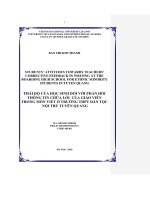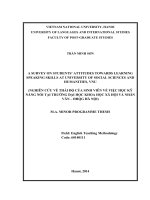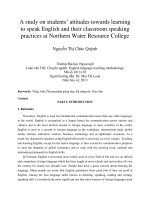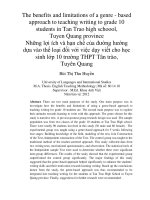English-language gifted students' attitudes towards project-based approach to learning writing
Bạn đang xem bản rút gọn của tài liệu. Xem và tải ngay bản đầy đủ của tài liệu tại đây (594.08 KB, 7 trang )
English-language gifted students' attitudes
towards project-based approach to learning
writing
Nguyễn Thị Thu Huyền
Trường Đại học Ngoại Ngữ
Luận văn ThS. Chuyên ngành: English Linguistics; Mã số: 60 22 15
Người hướng dẫn: M.A. Lê Văn Canh
Năm bảo vệ: 2010
Keywords: Tiếng Anh; Phương pháp dự án; Kĩ năng viết; Học sinh
Content:
PART ONE: INTRODUCTION
1. Rationale
Three educational approaches that are considered to be the dominant
approaches to teaching of the 21st century are (i) constructivist approaches; (ii)
problem-solving approaches; and (iii) collaborative learning approaches. All these have
a feature strongly in common: a move away from the static transmission models for skill
and knowledge acquisition that are based on traditional cognitive learning approaches
which emphasize learning as an incremental mathematically-facilitated process
(Hannafin, 1997). The new approaches, which draw upon situated learning and social
cognition theories (Hannafin, 1997), emphasize dynamic, situated learning
environments in which knowledge and the conditions under which it is constructed are
inextricably linked. It is interesting to note that these new learning approaches have
three characteristics in common with the origination of communicative approaches to
language teaching (Widdowson, 1978) - namely, that tasks have to be contextualized,
authentic and meaningful to the students.
Project-based learning, which has been strongly promoted in recent years,
encompasses all the core features of the three approaches mentioned above. However,
this approach to learning has not been popular in Vietnam. Particularly, it has not been
applied to the teaching of writing English as a foreign language. This study is an attempt
to explore the application of the project-based approach to teaching Vietnamese high
school students how to write English for academic purposes, and more importantly, the
students' attitudes towards this new teaching approach to writing.
2. Aims of the study
The study is aimed to find out students' strategies in project-based writing and
their attitudes towards this approach to writing.
In order to achieve the aims mentioned above, the study seeks to answer the
following two questions:
1. What strategies do the students use in their project-based writing?
2. What are their attitudes towards project-based approach to learning writing
skills in English?
3. Scope of the study
The study limits itself to the investigation of the strategies the high school
students used in carrying out writing projects as well as their attitudes to a project-
based approach to writing. The number of participants of the study is quite small and
these participants are those who had been selected for intensive training before six of
them were selected for the national English language contest held by the Ministry of
Education and Training annually. Therefore, no generalization is intended in this study.
4. Methods of the study
The study is a descriptive one, and it is an action research in nature. That is to
say to purpose of the study is to improve the researcher’s own classroom practice. The
only instrument used in the study is the questionnaire developed by the researcher
herself. Then data were analyzed statistically. The intervention described in the study
was made with an intact group of students. Since the purpose of the study was to
investigate the students’ strategies and their attitudes related to project-based writing,
no pretest and post test was used.
5. Significance of the study
Some researchers have cautioned that project-based learning may not work well
with students who do not take readily to this new approach (Felix, 1999; Levy, 1997),
and a great deal of guidance and intervention may be required to avoid potential
problems with group dynamics, assessment and time commitment. Given this caution,
the study is a contribution to an understanding of the applicability of the project-based
approach to the teaching of English in general and the teaching of writing for academic
purposes in particular in the context of a Vietnamese high school. Specifically, the
findings of the study will help the researcher and perhaps her colleagues to make
appropriate decisions on how to use project-based writing in her teaching to improve
the students’ writing proficiency.
6. Structure of the thesis
The thesis is composed of three parts.
Part I is the introduction in which the rationale, the aims, the scope, the methods,
the significance and the structure of study are presented.
Part II consists of two chapters. Chapter I is the literature review. In this chapter,
the literature on project-based learning as well as on writing English as a second or
foreign language is reviewed. Chapter II presents the study in which information about
the context of the study, the participants, the research procedures and the results is
provided.
Part III is the conclusion which summarizes the major findings of the study. Also
in this part, the implications for classroom practice, the limitations of the study and
suggestions for further studies are presented.
REFERENCES
1. Britton, T. et al. (1975) The development of writing abilities. London: Mc Millan
Education Ltd.
2. Byrne, D. (1991). Teaching writing skill - Longman handbooks for language teachers.
Longman: London.
3. Candlin, C.N. & Hyland, K. (1999). Writing: Texts, Processes and Practices. New York:
Addison Wesley Longman Limited.
4. Carter, G. & Thomas, H. (1986). Dear brown eyes: Experiential learning in a project-
oriented approach. ELT Journal, 40/3, 196-204.
5. Clark, I.L. (2003). Concepts in composition: Theory and practice in the teaching of
writing. London: Lawrence Erlbaum Associates Publishers.
6. Curtis, D. (2001). Start with the pyramid. Retrieved on 26th September, 2005 from
Edutopia Online at: />884&template=printarticle.php
7. Diehl, W., Grobe, T., Lopez, H., & Cabral, C. (1999). Project-based learning: Astrategy
for teaching and learning. Boston, MA: Center for Youth Development and Education,
Corporation for Business, Work, and Learning
8. Donato, R. (1994). Collective scaffolding in second language learning. In J.P. Lantolf &
G. Appel (Eds). Vygotskian Approach to Second Language Research. Norwood, N. J.:
Ablex Publishing Corporation.
9. Evans,T.D. & St John, M.J. (1998). Developments in ESP - a multi-disciplinary approach.
Cambridge: Cambridge University Press.
10. Felix, U. (1999). Web-based language learning: A window to the authentic world. In:
Debski, R. and Levy, M. (eds), WORLDCALL: Global Perspectives on Computer-Assisted
Language Learning. Amsterdam: Swets & Zeitlinger, 85-98.
11. Fried-Booth, D. (1982). Project work with advanced classes. ELT Journal. 36/2. 98-
131.
12. Fried-Booth, D. (1997). Project work (8th ed.). Oxford: Oxford University Press
13. Gallacher, L. (2004). Project work with teenagers. Retrieved December 21, 2004,
from British Council Teaching English website:
14. Haines (1989). Projects for the EFL classroom. London: Nelson.
15. Hannafin, M.J. (1997). The case for grounded learning systems design: What the
literature suggests about effective teaching, learning, and technology. ASCILITE
Proceedings, 255-262.
16. Harmer, J. (1998). How to teach English. Essex: Addison Wesley Longman Limited.
Hedge, T. (1988). Writing. Oxford University Press.
17. Jones, B. F., Rasmussen, C. M., & Moffitt, M. C. (1997) Real-life problem solving: A
collaborative approach to interdisciplinary learning. Washington, DC: American
Psychological Association.
18. Kinneavy, J. (1971). A theory of discourse. Englewood Cliffs, N. J.: Prentice Hall
(Reprinted 1980. New York: Norton).
19. Krajcik, J.S. et al (1998). Inquiry in project-based science classrooms: Initial attempts
by middle school students. The Journal of the Learning Sciences, 7, 313-350. In Thomas, J.
W. (2000). A review of research on project-based learning. Retrieved on 23 September
2005 from the website of Autodesk Foundation at:
20. Lannon, J.M. (1989). The writing process. A concise rhetoric. Southeastern
Massachusettes University.
21. Levy, M. (1997). Project-based learning for language teachers: Reflecting on the
process. In: Debski, R., Gassin, J. and Smith, M. (eds), Language learning through social
computing. Occasional Papers. 16. Melbourne: ALAA and the Horwood Language Centre,
181-199.
22. Moss, D. & Van Duzer, C. (1998). Project-based Learning for Adult English Language
Learners. National Clearinghouse for ESL Literacy Education Washington D.C.
21. North, S. (1990). Resource materials for library project work: ELT Journal, 44/3,
222-229.
22. Oshima, A. & Hogue, A. (1991). Writing Academic English (Second edition) Menlo
Park: Addison - Wesley Publishing Company.
23. Reid, J.M. (1993). Teaching ESL writing. New Jersey: Prentice Hall Regents:
Englewood Cliffs.
24. Steele, V. (n.d.). Product and process writing: A comparison. Retrieved September
21st 2005, from British Council Teaching English website:
25. Thomas, J.W., et al (1999). Project-based learning: A handbook for middle and high
school teachers. Novato, CA: Buck Institute for Education.
26. Thomas, J.W. (2000). A review of research on project-based learning. Retrieved on 23
September 2005 from website of Autodesk Foundation at:
PBL-Research.pdf.
27. Tribble, C. (1996). Writing. Oxford University Press.
28. Ur, P. (1996). A Course in Language Teaching. Great Britain: CUP.
29. Vu Thi Thanh Nha (2005). The benefits of a project-based approach to teaching
writing to first year students at College of Social Sciences and Humanities - Vietnam
National University: An experimental study. (MA thesis). University of Language and
International Studies, VNU - Hanoi.
30. White, R. V. (1981). Approaches to writing. Guidelines for writing activities.6, 1-11.
31. White, R. V. (1990). Academic writing process and product. In Robinson, English
publications in association with the British Council.
32. Widdowson, H.G. (1978). Teaching Language as Communication. Oxford: OUP.
33. William, J.D. (1998). Preparing to teaching writing: Research, theory and practice
(2nd ed.) Mahwah, New Jersey: Lawrence Erlbaum Association.
34. Wrigley, H.S. (1998). Knowledge in action: The promise of project-based learning.
Focus on Basics, 2 (D), 13-18.









